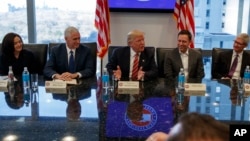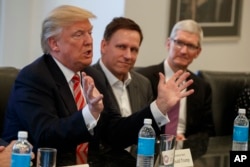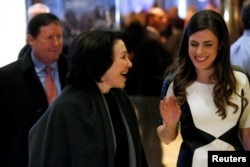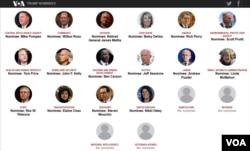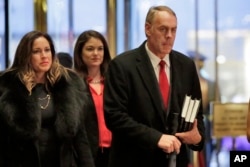President-elect Donald Trump met Wednesday with top executives from the biggest U.S. technology companies, many of whom were among his fiercest critics during this year’s election campaign, but there were no signs of lingering animosity during their discussions.
Trump’s office said he wants to begin a “conversation and partnership” to spark innovation and create more jobs.
The meeting at Trump’s New York City headquarters included Facebook Chief Operating Officer Sheryl Sandberg, Amazon CEO Jeff Bezos, Tesla CEO Elon Musk and Google co-founder Larry Page.
Trump struck a cordial and conciliatory tone at the start of the meeting.
“There’s nobody like the people in this room. ... We want you to keep going with the incredible innovation,” Trump said. “Anything we can do to help this go along, we’re going to be there for you.”
Trump invited the CEOs to call him directly if they want to talk, and suggested they meet again, as often as every three months.
The president-elect’s office said Trump had “open mind and willingness to listen” during the talks, and that his approach was “greatly received” by the tech leaders.
None of the CEOs spoke afterward to reporters, but Bezos later issued a statement calling the talks “very productive.”
“I shared the view that the administration should make innovation one of its key pillars, which would create a huge number of jobs across the whole country, in all sectors, not just tech — agriculture, infrastructure, manufacturing — everywhere,” he said.
Many of the tech leaders had strong misgivings about a Trump presidency before the election because of his strong criticism of China, his threats to tear up trade deals and plans to curb immigration, which would limit the number of highly qualified workers available to technology companies.
An open letter signed Tuesday by employees of more than 200 tech firms pledged not to help Trump develop a data registry to track people based on their religion, or for possible deportation.
During the campaign, Trump often clashed with Silicon Valley. He called on voters to boycott Apple because of its position on privacy and vowed to “get Apple to start making their computers and their iPhones on our land.”
He faced off against Facebook CEO Mark Zuckerberg over immigration and accused Bezos of using the newspaper he owns, The Washington Post, in a scheme to avoid taxes. The influential daily has been critical of Trump in its editorial pages.
Trump promised the tech executives he would put together “fair-trade deals” that would “make it a lot easier for you to trade across borders.”
Before entering the meeting, Oracle Chief Executive Safra Catz said that if Trump can “reform the tax code, reduce regulation, and negotiate better trade deals, the U.S. technology community will be stronger and more competitive than ever.”
Department of Energy
Trump Nominees Interactive Map
Click here for a look at Trump's nominees for Cabinet and other leadership posts.
In another development Wednesday, Trump formally named a one-time political foe, former Texas Republican Governor Rick Perry, to head the country's Department of Energy, a sprawling agency Perry once said should be abolished as wasteful.
Perry called Trump a “cancer to conservatism” very early in the presidential race. But he endorsed Trump after he dropped out, calling him “the people’s choice.”
The Energy Department oversees the country’s nuclear-weapons arsenal and promotes development of green-energy projects.
Critics say Perry could shift the department away from its recent focus on renewable energy back toward oil and fossil fuels, which Perry promoted in oil-rich Texas even while he turned the state into a major producer of wind-power.
Republican Party chairwoman
The president-elect also named Ronna Romney McDaniel, the Michigan Republican Party chairwoman, to head the Republican National Committee, replacing Reince Priebus, who will be Trump’s chief of staff at the White House.
McDaniel is the niece of former Republican presidential candidate Mitt Romney, who had been among those Trump considered for the secretary of state post. She will be the first woman to hold the party position in 40 years — since Mary Louise Smith of Iowa in 1974.
Department of the Interior
Trump also is reportedly going to nominate Republican Congressman Ryan Zinke of Montana, a former Navy Seal, to head the Interior Department.
Zinke, described by The Washington Post as a lifelong hunter and fisherman, is a proponent of keeping public lands under federal ownership. That position would put him at odds with those in the Republican Party who favor privatization, or placing federal lands under the control of states.
Trump also has said he does not think public land should be placed under state control.




